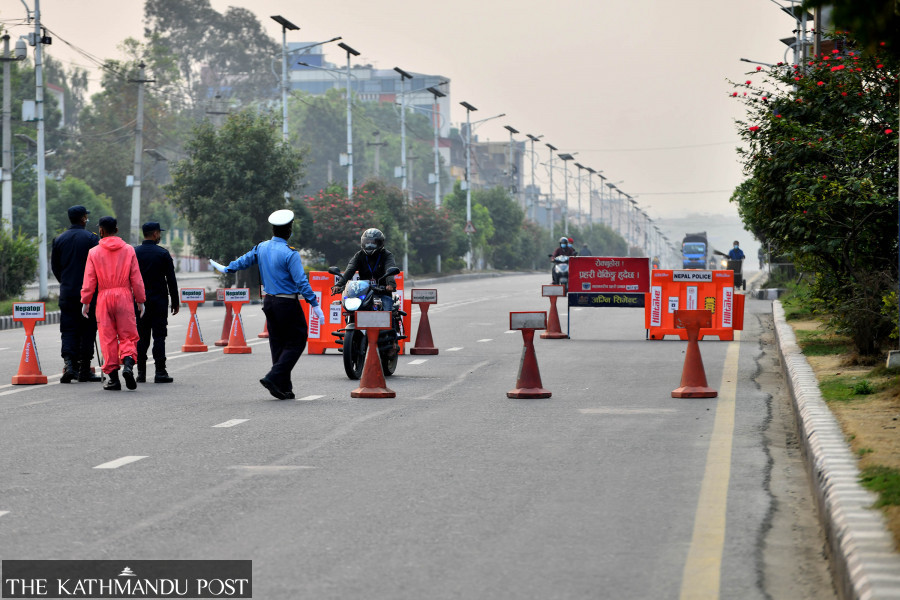Valley
Government routinely renews prohibitory orders but does little to enforce them
Public health experts say the government’s rapid reopening of the economy may invite a third wave of coronavirus.
Anup Ojha
Last Thursday, the three chief district officers of Kathmandu Valley held a meeting to extend the Covid-19 prohibitory orders by 10 days starting Friday without any substantial changes in their earlier announcements.
This time also the Valley administrators announced to continue the ban on public gatherings and rallies, and close business houses that attract crowds. The prohibitory orders notice states that barbershops, beauty parlours and gyms will remain closed during the period of restrictions.
The orders, however, are limited to a mere ‘announcement’ as hardly anyone is following them, health experts say.
Last week rallies and mass gatherings were ubiquitous in the Valley’s roads after the Supreme Court overturned KP Sharma Oli’s May 21 decision to dissolve the House of Representatives and ordered President Bidya Devi Bhandari to appoint Nepali Congress President Sher Bahadur Deuba as prime minister.
As per the prohibitory orders, public vehicles can carry passengers only to their seating capacities by following the health protocol and restaurants can provide takeaway services only until 7pm, among other things.
There, however, are complaints that the Valley authorities are paying little attention to enforcing the curbs. The district heads appear only to be renewing the orders periodically.
“The problem with the Valley administrators is that they meet and make a decision. They do not care about implementing their announcement effectively,” said Dr Baburam Marasini, former director of the Epidemiology and Disease Control Division.
On Sunday the country reported 1,223 new cases of Covid-19 with 23 fatalities. Of the total infections, Kathmandu Valley recorded 334 new cases in the past 24 hours. According to the Ministry of Health and Population, 234 cases were confirmed in Kathmandu, 64 in Lalitpur and 36 in Bhaktapur.
Marasini says there are three things lacking between the government authorities: mobilisation, capacity building and coordination. “After these authorities make their decisions they should mobilise necessary manpower to ensure that the decisions are implemented,” said Marasini.
In the past one week, almost all the eateries have opened to customers with some looking quite full of people enjoying meals with family and friends.
“The chief district officers could have coordinated with the Hotel Association of Nepal and with their help they could have made certain protocols for serving customers but they are too lazy to make effective plans,” said Marasaini.
He expressed fears that the present trend of unchecked public and mass movement could lead to devastation. “We are still in the risk zone, and anytime the third wave could hit if the pandemic is not taken seriously,” said Marasini.
He even charged the government authorities with not coordinating with public transport operators for effective implementation of the health protocol.
Although the notice published by the Kathmandu District Administration Office states that public vehicles operating inside the Valley will have to make sure that passengers wear masks, and drivers and helpers wear masks, visors and gloves and place sanitisers at the door of each public vehicle, they are hard to find. Safa tempos and blue micro buses cannot carry more than nine passengers and are required to put a plastic sheet separating two sides in the aisle but that is hard to find.
Most of the tempos and micro buses are being operated without installing plastic screens and public vehicles are seen carrying passengers beyond their capacities during the office times. Although the government has not yet allowed public transport vehicles to operate on long routes, private and public bus operators are still carrying passengers by charging them exorbitant fares by misusing passes issued by local authorities.
Announced on April 29, the prohibitory orders have stayed in Kathmandu for over two months now even though most of the restrictions have been relaxed over the past few weeks. In the first week of June, the lockdown was gradually loosened. After the third week of June, when public buses were allowed to ply on odd and even number plate basis and businesses to operate on alternate days, the authorities paid no heed to enforcing the curbs effectively.
Dr Sher Bahadur Pun, chief of the Clinical Research Unit at the Teku-based Sukraraj Tropical and Infectious Disease Hospital, says the laxity shown by both government agencies and the public may create a difficult situation. If there is a new variant of concern, this will fuel a potential third coronavirus wave, said Pun.




 11.43°C Kathmandu
11.43°C Kathmandu.jpg)













